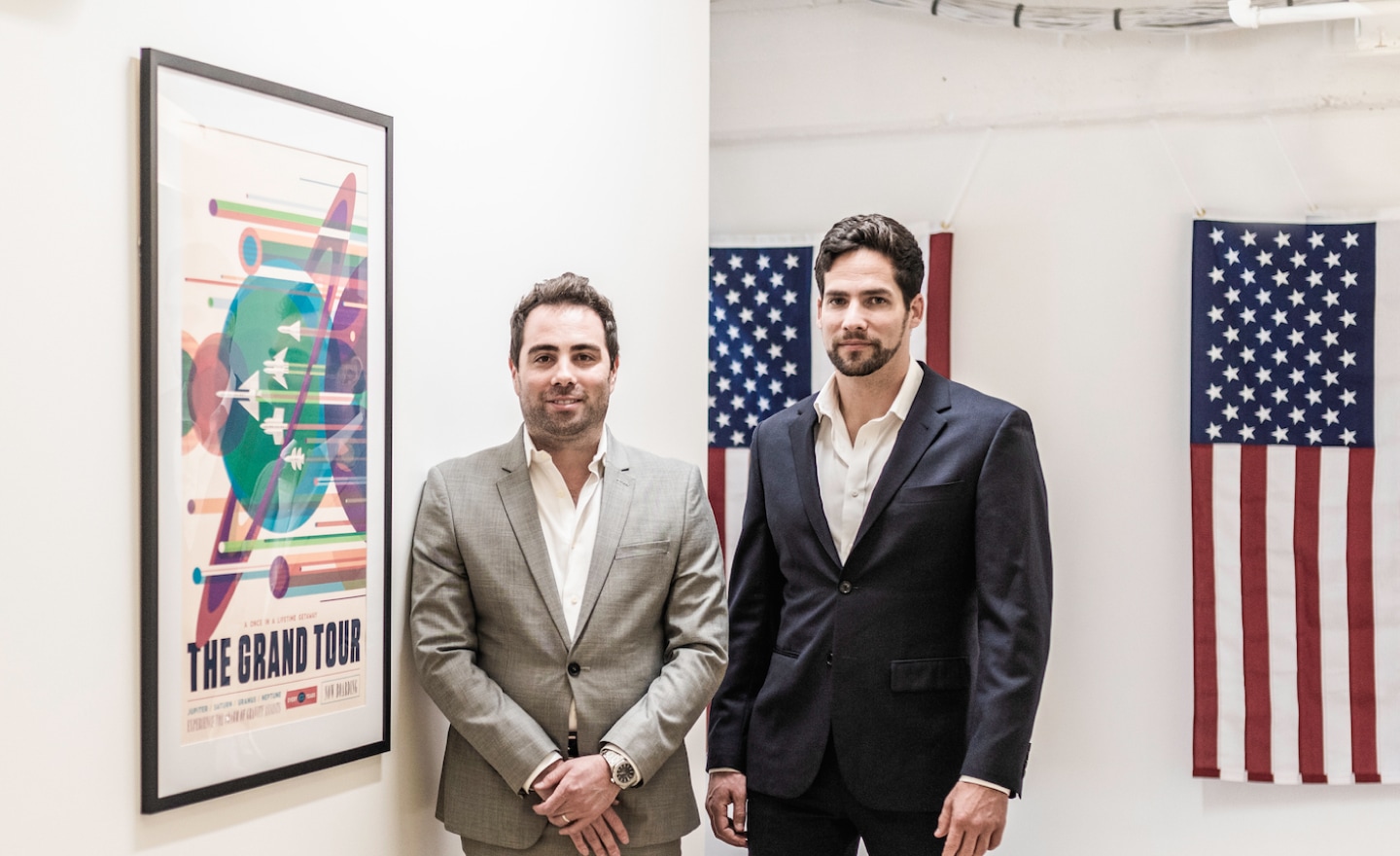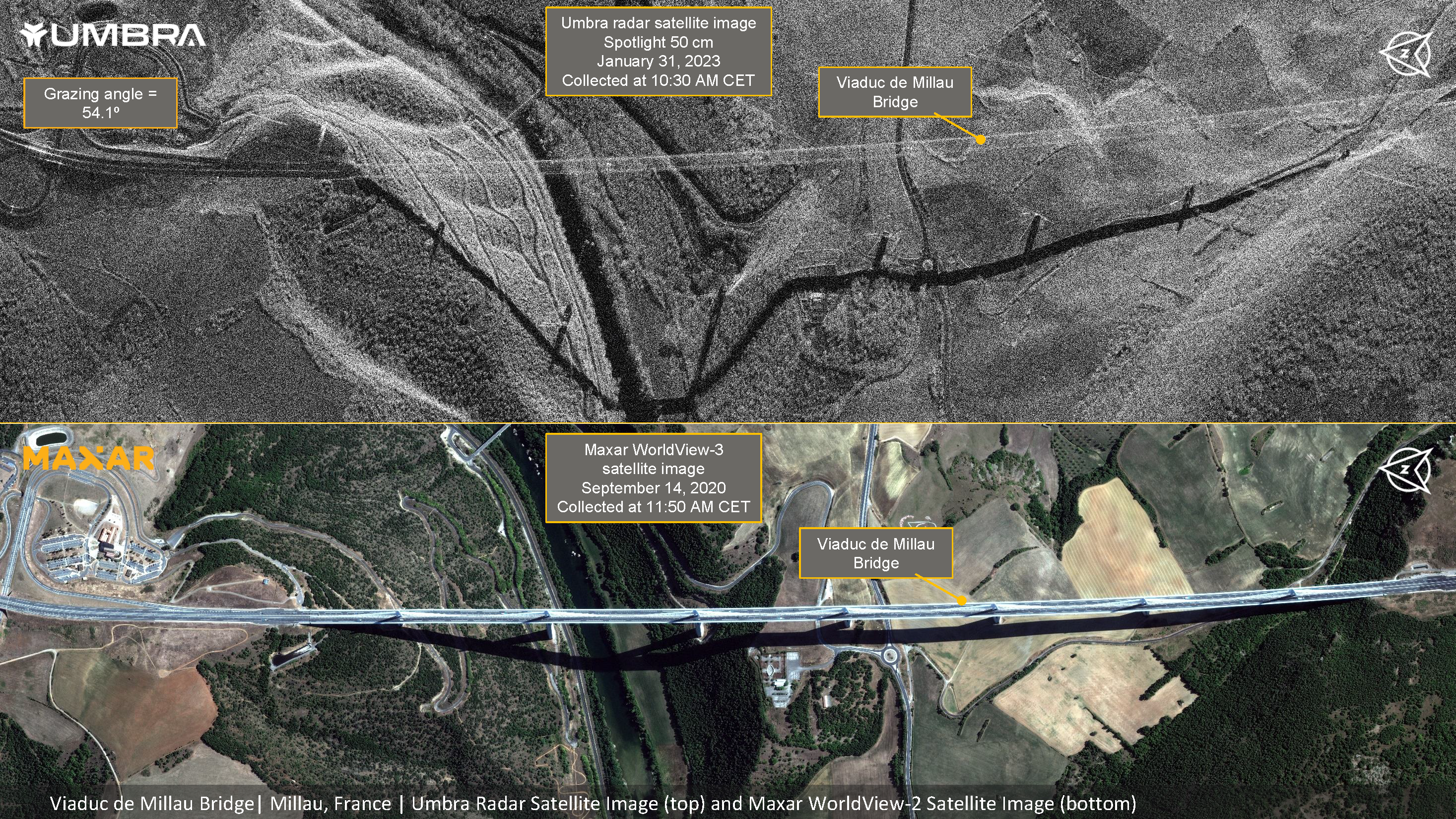Umbra co-founder Gabe Dominocielo’s last name is roughly translated from the Latin as “lord of the skies.” It’s a fitting title for the head of a satellite imagery company — but in a recent interview with TechCrunch, he joked that his last name should be “unit economics.”
“Space isn’t my background,” he said. “My passion is unit economics.”
Umbra’s story can be summed up as a marriage of technological innovation and — you guessed it — sound unit economics. The company was founded by Dominocielo, who previously started a company that coordinated class actions for plaintiffs lawsuits, and his longtime friend David Langan, an engineer who spent a decade working on advanced space programs at major aerospace companies.
Langan invented a very large parabolic mesh radar antenna for a microsatellite form factor. The antenna, which is designed to fold up for launch, is capable of using a full 1,200 MHz of bandwidth and generating a field of vision that extends up to 1,200 kilometers on either side. Like other synthetic aperture radar (SAR) systems, it can see through clouds and at night. But unlike all other SAR systems that existed before, or exist today, it can capture images at resolutions up to 15 centimeters. That’s high enough to detect a soda can from space.
To Dominocielo, the science was intriguing, but the business case was what made the proposition truly compelling.
“You can’t just have a better product that costs less money,” he said. “It has to be much, much better, and you have to be able to make significantly more money. When we fly over a high-demand area, we take 10 to 15 times more pictures than any startup or any legacy company, which means on a per unit basis, we’re able to make 10 times the amount of money.”
The pair went to work.

Bootstrapping into orbit
Umbra has raised more than $100 million since its founding in 2015, with the most recent Series B funding closing in March. Its investors include Nimble Partners, Star Castle Ventures, Champion Hill Ventures and Starbridge Venture Capital. Its valuation now sits at $750 million pre-money, according to a person familiar with the company’s financials.
But before any of this capital was raised, Langan and Dominocielo spent two years bootstrapping the company, and this decision feels central to the rest of Umbra’s history and one of the keys to its success.
Venture capitalists have enthusiastically embraced so-called NewSpace companies over the past decade, with private market investors pouring over $280 billion into the industry since 2014, according to Space Capital’s most recent quarterly report. But venture dollars do not come without expectations and costs to founders.
Dominocielo said those costs would have been dire.
“Rather than using our own money for the first two years, had we gone out and just gotten a million dollars or something for a pre-seed, it would have been really bad,” he said. “You’re forced to move fast. So you go with your first design and you just get to space as quickly as possible. We didn’t have that pressure, because it was our own money.”
As a result of this early decision to bootstrap, Dominocielo and Langan have been able to maintain considerable control over their company. Umbra’s board consists of just three people: the two founders and John Burbank, founder of prominent San Francisco-based hedge fund Passport Capital and an early angel investor in the company. Umbra’s headcount, which currently sits at around 125 people, has always been tied to how much money the company is making, rather than how much they’ve raised, Dominocielo added.
One of the other significant consequences of not taking investor money early on is that Dominocielo and Langan decided not to offer data analytics along with satellite imagery. Satellite imagery companies that do choose to offer analytics choose to fight battles on two fronts — against other SAR satellite operators and established analytics behemoths, like Palantir and Google — and must raise even more capital to build out these capabilities.
The pair was up against a number of very hard technical challenges as it was: They were told that a folding antenna was impossible for the form factor they were designing. But once the core technologies were essentially in place, they went out and started raising capital, beginning with a small pre-seed round in 2018.
Private and public dollars
By dollar amount raised, Umbra does not lead against its competitors. In comparison to Umbra’s $100 million, European SAR imagery startup Iceye has raised around $259 million, while U.S.-based Capella Space has closed upwards of $251 million.
Umbra’s presence has been kept similarly low-key. When the company announced earlier this year that it had captured the highest-resolution publicly available image from space, ever, the news made barely a ripple.
But Dominocielo does not see raising money or getting press as accomplishments in and of itself.
“I talk to founders all the time and I always tell them, if you can do this on your own, or if you can just grind it out on government contracts, you’re going to be so much better off. Because one, you’ll understand the need and demand from the government. And you’ll be able to build to that and continue to get money without diluting.”
Indeed, government contracts now make up the majority of Umbra’s revenue, with around 50% coming from the U.S. government, which purchases Umbra’s highest-resolution images; 25% from allied foreign governments; and the final quarter coming mostly from large industrial commercial customers from sectors like oil and gas or insurance, and individual consumers, who have access to image resolutions up to 25 centimeters. The company makes a point not to sell to China, Russia or other countries that have adversarial relationships to the United States.
Core to Umbra’s approach to the market is its transparent pricing policy, which applies to both government and commercial customers, and an extremely permissive open licensing agreement. Umbra also allows users to directly task a satellite, and offers an open data library, which has opened a whole host of new use cases for SAR data.
The company is upfront about its prices for the same reason that it doesn’t offer analytics: To their mind, why compete with your customers? Instead, Umbra’s strategy is to build partnerships with other enterprises. Some will likely prove to be quite consequential, like its recent agreement with optical imagery company Maxar, which will let Maxar directly task Umbra satellites and make that data available to Maxar customers.

“Building that sales pipeline would cost an insane amount of money, and would take an insane amount of time. But doing a deal with the clear number one winner in optical satellite imagery accelerates our growth exponentially, [by] orders of magnitude,” said Dominocielo.
The government appreciates the transparency even more than the commercial sector customers, he added. And the government’s appetite for Umbra’s SAR imagery has only increased, especially as the company’s been able to demonstrate more capabilities over time. Over the past few years, Umbra has landed contracts from major government agencies, including the Air Force and the National Reconnaissance Office. Most recently, Umbra won a $4.5 million award from the Defense Advanced Research Projects Agency (DARPA), the research arm of the Pentagon. It’s an amount that may seem small compared to some of Umbra’s other wins, but which will substantially advance SAR collection techniques.
In the meantime, Umbra has been focused on improving its satellite technology even more. The next spacecraft iteration, which will likely go up next year, will have even more power and bandwidth, Dominocielo said.
“We’re not in the business of building what the government or commercial customers need today,” he said. “It’s what they need to fight the battle of 2030 or 2040. That’s what we’re building.”































Comment